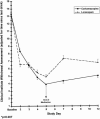The effects of carbamazepine and lorazepam on single versus multiple previous alcohol withdrawals in an outpatient randomized trial
- PMID: 12047731
- PMCID: PMC1495040
- DOI: 10.1046/j.1525-1497.2002.10201.x
The effects of carbamazepine and lorazepam on single versus multiple previous alcohol withdrawals in an outpatient randomized trial
Abstract
Objective: Benzodiazepines are the mainstay of treatment for mild-to-moderate alcohol withdrawal in outpatient settings, but they can interact with alcohol, cause motor incoordination, or be abused. This study compared the therapeutic responses of the benzodiazepine lorazepam and the anticonvulsant carbamazepine for the outpatient treatment of acute alcohol withdrawal in terms of patients' previous detoxification histories, and compared the effects of these 2 medications on drinking behaviors in the immediate postdetoxification period.
Design: This was a randomized double-blind trial comparing patient responses to carbamazepine and lorazepam across 2 levels of detoxification histories (0-1 or >or=2 previous medicated detoxifications).
Setting: A university medical center substance abuse clinic in Charleston, SC.
Patients: One hundred thirty-six patients in moderate alcohol withdrawal were randomized. Major exclusions were significant hepatic or hematologic abnormalities and use of medications that could alter withdrawal symptoms.
Interventions: Patients received 600-800 mg of carbamazepine or 6-8 mg of lorazepam in divided doses on day 1 tapering to 200 mg of carbamazepine or 2 mg of lorazepam.
Main outcome measures: The Clinical Institute Withdrawal Assessment for Alcohol-Revised was used to assess alcohol withdrawal symptoms on days 1 through 5 and postmedication at days 7 and 12. Daily drinking was measured by patient report using a daily drinking log and a breath alcohol level with each visit. Side effects were recorded daily.
Results: Carbamazepine and lorazepam were equally effective at decreasing the symptoms of alcohol withdrawal. In the post-treatment period, 89 patients drank on at least 1 day; on average, carbamazepine patients drank less than 1 drink per drinking day and lorazepam patients drank almost 3 drinks per drinking day (P =.003). Among those with multiple past detoxifications, the carbamazepine group drank less than 1 drink per day on average and the lorazepam group drank about 5 drinks per day on average (P =.033). Lorazepam-treated patients had a significant rebound of alcohol withdrawal symptoms post-treatment (P =.007) and the risk of having a first drink was 3 times greater (P =.04) than for carbamazepine-treated patients. Twenty percent of lorazepam-treated patients had dizziness, motor incoordination, or ataxia and did not recognize their impairment. Twenty percent of carbamazepine-treated patients reported pruritus but no rash.
Conclusions: Carbamazepine and lorazepam were both effective in decreasing the symptoms of alcohol withdrawal in relatively healthy, middle-aged outpatients. Carbamazepine, however, was superior to lorazepam in preventing rebound withdrawal symptoms and reducing post-treatment drinking, especially for those with a history of multiple treated withdrawals.
Figures
Comment in
-
Carbamazepine effective for alcohol withdrawal.J Fam Pract. 2002 Sep;51(9):778. J Fam Pract. 2002. PMID: 12366898 No abstract available.
References
-
- Stinnett J. Outpatient detoxification of the alcoholic. Intrl J Addictions. 1982;17:1031–46. - PubMed
-
- Miller W, Hester R. Inpatient alcoholism treatment: who benefits. Am Psychol. 1986;41:794–805. - PubMed
-
- Webb M, Unwin A. The outcome of outpatient withdrawal from alcohol. Br J Addiction. 1988;83:929–34. - PubMed
-
- Alterman A, Hayasida M, O'Brien C. Treatment response and safety of ambulatory medical detoxification. J Stud Alcohol. 1988;49:160–6. - PubMed
-
- Hayashida M, Alterman A, McLellan T, et al. Comparative effectiveness and costs of inpatient and outpatient detoxification of patients with mild-to-moderate alcohol withdrawal syndrome. N Engl J Med. 1989;320:358–65. - PubMed
Publication types
MeSH terms
Substances
Grants and funding
LinkOut - more resources
Full Text Sources
Other Literature Sources
Medical
Miscellaneous




